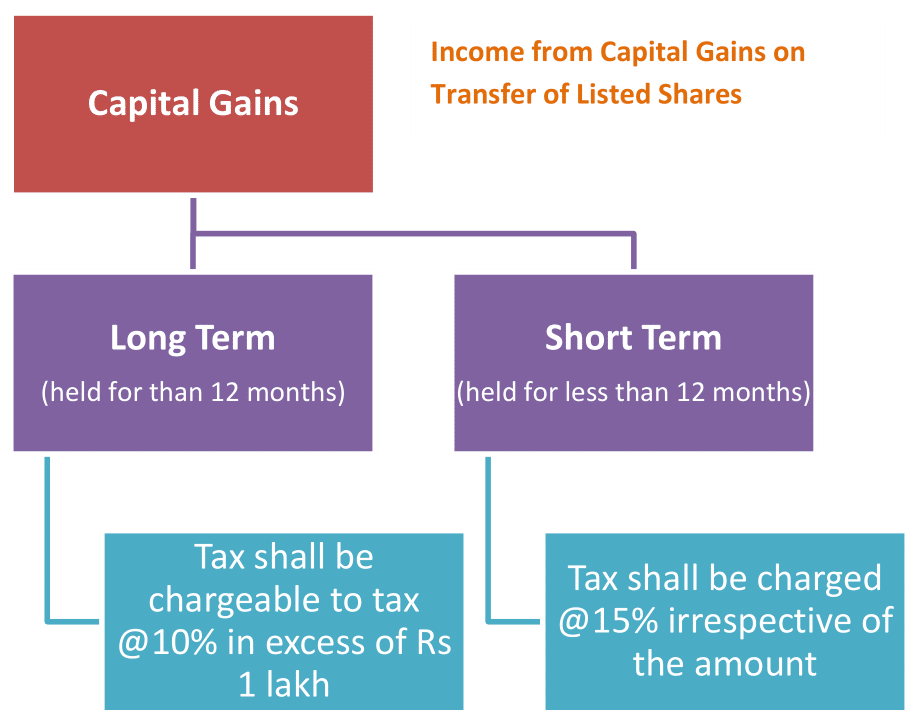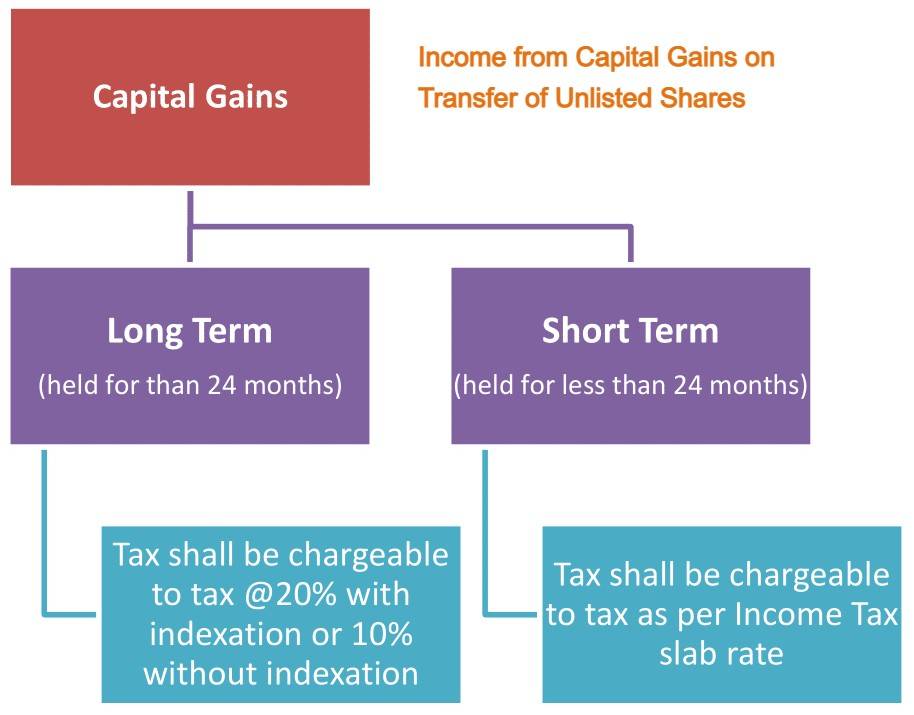Share on Social 👇
Treatment of Income Tax on Shares: Capital Gains or Business Income
Income from transfer shares can be either treated under the head “Income from Business” or “Income from Capital Gains”.
People make Investments for the purpose of generating more sources of income. And, one such source of investment could be investing in shares or mutual funds. Further, investing your earnings in shares or mutual funds could be sahi hai as shown in the ads in newspapers and televisions, but it requires the due attention of the investor to the disclaimer that the shares are subject to market risk, read all the documents carefully before investing.
Let’s have a look at, how can you treat income from transfer of shares.
Income From Business
If you are an individual who is involved in significant trading activity or you trade in Future or Options on a regular basis, then your earnings from the transfer of shares will be under the head “Income from Business”. Consequently, in such a case, the individual has to file ITR-3.
While filing the Income Tax Return, the individual can reduce the expenses incurred in earning such earnings and profits are added to the total earnings of the individual. The Income Tax to be charged on such earnings is as per the Income Tax Slab of the prevailing financial year.
NOTE:
If the individual does not have an intention of holding the shares, then the earning from transfer of such shares will be treated as earning amount from the business.
Income From Capital Gains
On the contrary to the above, if you do not do significant trade activity or trade-in Future of Options, then you can treat income from the transfer of shares as capital gains. Further, the capital gain is when the sale price is more than the purchase price.
In addition to the above, earnings from capital gains are dependent on three factors:
- Firstly, the period of holding of shares
- Secondly, the nature of the instrument – shares, equity mutual fund or debt mutual fund, and
- Thirdly, payment of STT (Securities Transaction Tax)
Capital Gains have been classified into two types:
- Long Term Capital Gains
- Short Term Capital Gains
Treatment Of Capital Gains For Listed Shares

- If the holding of listed shares is for more than 12 months, then the gains from the transfer of shares shall be classified as Long Term Capital Gains. Accordingly, tax shall be chargeable to tax @10% above Rs. 1 lac.
- On the other hand, if the holding of listed shares is for less than 12 months, then the gains from the transfer of such shares are Short Term Capital Gains. Accordingly, tax shall be chargeable @15% irrespective of the amount.
Capital Gains Treatment For Unlisted Shares

Unlisted Shares, the holding of which for more than 24 months are Long Term Capital Gains. Whereas, the shares whose holding period is less than 24 months are Short Term Capital Gains.
Note:
This is with effect from Assessment Year 2017-2018.
Treatment Of Income
To treat earning from shares as income from business or earning from capital gains has been a matter of litigation. Therefore, to avoid ambiguity, CBDT had issued circular no. 6/2016 dated 29th February, 2016 which clarifies the position.
- If the taxpayer opts to classify his equity holdings as stock-in-trade, then treatment of the earnings shall be under business income. In such cases, the AO shall accept the choice of the taxpayer and there shall be no grounds for dispute.
- In case of long-term holdings (more than 12 months), the taxpayer is entitled to opt to treat the same as capital gains and the AO shall not dispute the same. However, the taxpayer shall maintain consistency in this classification and once opted will not be changed in future years.
- In all the other cases, basic premise for classification of capital gains versus business income will be predicated on the concept of “Significant trading activity”. If the stock portfolio is churned frequently, then the income shall be classified as business income. The dispute, therefore, boils down to the classification of STCG on equities.
Significant Trading Activity
While the definition of Significant Trading Activity (STA) is not defined anywhere, the CBDT has indicated some broad rules that will be used for this classification. The decision will conclude down to whether the short-term equity holdings are to be classified as Investments or as Stock-in-Trade. Here are some such broad rules that are indicative of the same:
– Volume of equity
While there are no hard and fast cut-offs, some online brokers do advise traders to classify as business income if the trading volumes in a particular fiscal year exceed Rs.1 crore.
– Ratio of Purchases to Sale
If the purchases and sales of shares are of similar magnitude it is typical of a trader and must be classified as business earning. The activity of buying and holding the shares is more of a sign of an investor.
– Average period
Normally if your average holding period is shorter, then it is more likely to be business income rather than classified as capital gains.
– Activity in the Future & Options
A trader being more active in Future & Options is a sign of a shorter time frame and a greater intent to trade. Therefore, it is to be treated as Income from business.
Please note that despite this, the period of holding the stock and the intention of the trader is seen to determine whether the income is from business or capital gains. Once the individual has opted between the two choices, he will have to continue with the same for a subsequent number of years unless there is change in the circumstances of the case.
Which ITR Is To Be Filed?
- In case, the assessee does “trading” in shares, then the income from transfer of shares will be treated as earning from “profits and gains from business and profession”. Accordingly ITR-3 is to be filed.
- Alternatively, if turnover from share trading is less than Rs. 2 crore, then earning may be offered to tax on presumptive basis, at the rate of 6% of turnover (or 8% of turnover, if electronic clearing system is not used). In this case, a simpler form- ITR 4, may be used.
- In case of non-trading activities, the ITR for income on transfer on shares is to be filed in form ITR-2.
Illustration
Name | Rani | Karishma | Preeti | Alia | Deepika | Priyanka |
Type of Share | Listed Shares | Listed Shares | Listed Shares | Unlisted Shares | Listed Shares | Unlisted Shares |
Purpose of Holding | Trading | Non Trading | Trading in Future or Options | Non trading | Non trading | Non trading |
Shares Purchased On | 01.01.2019 | 01.01.2019 | 01.01.2019 | 01.01.2019 | 01.01.2019 | 01.01.2019 |
Shares Sold On | 01.02.2020 | 01.04.2019 | 01.02.2020 | 01.04.2019 | 01.02.2020 | 01.02.2021 |
Total Duration
| 13 months | 90 days | 13 months | 90 days | 13 months | 25 months |
Treatment of Income | Income from business | Income from Short Term Capital Gains (less than 12 months)
| Income from business | Income from Short Term Capital Gains (less than 24 months) | Income from Long Term Capital Gains (more than 12 months) | Income from Long Term Capital Gains (more than 24 months) |
Income Tax Applicable | As per Income Tax Slab
| Tax shall be charged @15% irrespective of the amount | As per Income Tax Slab
| As per Income Tax Slab
| Tax shall be charged @10% in excess of Rs. 1 lac
| Tax shall be charged @20% with indexation or 10% without indexation |
Reasons | Rani has held listed shares for the purposes of trading, the income from transfer of shares shall be treated as “income from business” | Karishma has held listed shares for non trading purposes and for a duration less than 12 months. Therefore, income from transfer of shares shall be treated as “Income from Short Term Capital Gains” | Preeti trades in Future or Options. Therefore, income from transfer of such shares shall be treated as “income from business” | Alia has held unlisted shares for a period of less than 24 months. Therefore, income from transfer of shares shall be treated as “Income from Short Term Capital Gains” | Deepika has held listed shares for a period of more than 12 months. Therefore, income from transfer of shares shall be treated as “Income from Long Term Capital Gains” | Priyanka has held unlisted shares for a period of more than 24 months. Therefore, income from transfer of shares shall be treated as “Income from Long Term Capital Gains” |
The above provisions are applicable to resident individuals and HUFs.
NOTE:
The taxability charges for long term capital gains and short term capital gains for listed and unlisted shares are different.
